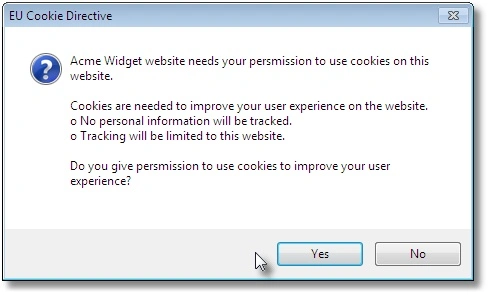EU Cookie Directive. Damaging the competitiveness of UK and EU companies.
When I started this blog I never expected I would end up writing an article about a European Community Directive. Let alone one with such a catchy title.
The new EU Cookie Directive comes into force on 25 May 2011 and will require any use of cookies by a website, except for the purpose of fulfilling the demands of a shopping cart, to require the consent of the website visitor. At first blush, certainly to a naive technology user, that sounds OK. “Cookies are used for tracking. I don’t want to be tracked. Ban cookies!”
But not all cookies are bad. Consider the following cookies uses (which we use on this website).
- Google Adwords. Track if someone that clicked an advert on Google (which we paid for) downloads our software. Only works on our website. We cannot use this to track users of our website on other websites.
- Google Analytics. Track website effectiveness. Only works on our website. We cannot use this to track users of our website on other websites.
- Hubspot. Monitor inbound marketing effectiveness. Only works on our website. We cannot use this to track users of our website on other websites.
- A/B Testing. Only works on our website. We cannot use this to track users of our website on other websites.
- Shopping Cart. Only works on our website. We cannot use this to track users of our website on other websites.
I think you should have spotted a theme in the above. All of the above are for our use only and cannot be used to monitor someone once they leave our website. All of these services are provided by third-party companies. We have no control over how they use the cookies to collect the data they collect, but they only collect data about our website, because that is their job. Furthermore, we have no ability to change how the data they collect is collected. So we either use their services or we do not.
So how does this damage competition?
The directive requires that for cookies to be used for anything other than a shopping cart, the user must be asked permission.

At this point you are instantly refusing to let the user view the website content and forcing them to interact with a popup that asks them a question most people will not understand.
How many web users know what a cookie is, or what it is used for?
Most users when confronted with this dialog box will not know how to choose correctly. Others confused by the question will abandon the website altogether and go and find a website (that is not in the EU) that doesn’t ask them such a confusing question. Every time that happens the UK or EU company that lost that visitor has potentially lost some business. This is not good for our economy and hinders our competitive position compared to the rest of the world.
What the EU Cookie Directive should disallow
The intent of the EU Cookie Directive was to ask for the user’s permission to track them across multiple websites for the purpose of providing advertising-related tracking. You can see how there may have been good intent with this directive. But it has been expanded to encompass tracking of every type, whether that tracking is for advertising, or as shown above for perfectly benign activities that do not invade the user’s privacy but do increase the effectiveness and usability of the website.
The EU Cookie Directive should be restricted to dealing with cookies for advertising.
If that is not possible then exceptions for the use of cookies should be made for internal website tracking, where the tracking is provided by the website or by a third party. For the purpose of this tracking cannot be cross-linked to another website. This allows Google Analytics, Google Adwords, Hubspot, all A/B testing services, shopping carts and the like. This provision bans cross-site advertising tracking, thus satisfying the EU Cookie Directive.
Please let me know your thoughts in the comments section below.